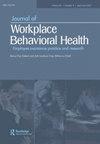管理者的职业认同、工作和倦怠:高绩效人力资源管理实践是否起到了调节作用?
IF 0.8
Q3 PUBLIC, ENVIRONMENTAL & OCCUPATIONAL HEALTH
引用次数: 5
摘要
摘要本研究旨在检验管理者的职业认同、高绩效管理实践和管理者的倦怠之间的关系。我们提出了一个将身份理论融入压力和人力资源管理研究的理论模型。我们研究了一个命题,即对管理者身份的弱验证将与更高水平的倦怠相关,而高绩效人力资源管理实践(HPHRMP)缓和了这种关联。数据来自SALVEO,这是一项在魁北克省(加拿大)进行的横断面研究。数据来自56个工作场所的314名管理人员。研究结果表明,对管理者身份的某些标准的低水平验证与倦怠之间存在显著关联,主要是工作需求和认可。因此,关于工作需求的低水平身份验证与低水平的倦怠有关。而关于识别的低水平身份验证与高水平的倦怠有关。HPHRMP并没有调节管理者对职业身份的验证与职业倦怠之间的关系。很少有研究分析管理者的职业认同、倦怠和HPHRMP之间的联系。通过整合身份理论,本研究开发的理论模型为解释管理者的倦怠提供了一个新的视角。本文章由计算机程序翻译,如有差异,请以英文原文为准。
Occupational identity, work, and burnout among managers: Do high performance human resource management practices play a moderator role?
Abstract This study seeks to examine the association between managers’ occupational identity, high performance management practices, and managers’ burnout. We propose a theoretical model that integrates identity theory into stress and human resource management research. We investigate the proposition that a weak verification of manager’s identity will be associated with a higher level of burnout, and that high-performance human resource management practices (HPHRMPs) moderate this association. Data came from SALVEO, a cross-sectional study conducted in the province of Quebec (Canada). Data were obtained from 314 managers nested in 56 workplaces. The results show a significant association between a low level of verification of some standards of the manager’s identity and burnout, mainly work demands and recognition. Thus, a low level of identity verification regarding work demands is associated with a low level of burnout. While a low level of identity verification regarding recognition is associated with a high level of burnout. HPHRMPs do not moderate the relation between managers’ verification of occupational identity and burnout. Seldom are studies that have analyzed the link between managers’ occupational identity, burnout, and HPHRMPs. By integrating the theory of identity, the theoretical model developed in this research offers a new perspective to explain managers’ burnout.
求助全文
通过发布文献求助,成功后即可免费获取论文全文。
去求助
来源期刊

Journal of Workplace Behavioral Health
PUBLIC, ENVIRONMENTAL & OCCUPATIONAL HEALTH-
CiteScore
2.40
自引率
6.70%
发文量
14
期刊介绍:
The Journal of Workplace Behavioral Health, retitled from Employee Assistance Quarterly to better reflect its expanded focus, presents innovative research, applied theory, and practical information to keep workplace human service administrators, counselors, and consultants up to date on the latest developments in the field. This refereed journal is an essential guide to best practice and research issues faced by EAP professionals who deal with work-related and personal issues including workplace and family wellness, employee benefits, and organizational development.
 求助内容:
求助内容: 应助结果提醒方式:
应助结果提醒方式:


